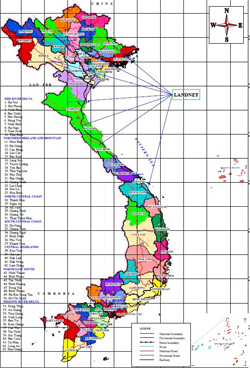.jpg)
Overwhelming difficulties for the community
The remaining natural forest in Dong Thang commune, Dinh Lap district, Lang Son province is the home of Tay and Dao ethnic minority groups. Ten years ago, it was a special use forest where any exploitation was strictly prohibited to preserve the biological diversity of animals and plants. Few people know that this quiet area is a unique forest in the northern part of the nation with ideal natural conditions for the development of a precious green ironwood mushroom. It is also famous for cataplasms produced by over 150 kinds of natural plants, harvested by Tay ethnic people or for traditional medicinal herb baths of the Dao ethnic people (good for woman after having a baby).
After 2 hours on motorbikes, passing 17 kilometres of forest trail from the centre of Dinh Lap town, we reached Dong Thang commune. The weather was nice. No rain. However, slippery roads caused by light rains would be challenging for riders, and many parts of Dong Thang commune would be isolated by heavy rains, due to the need to cross streams.
The survey group, consisting of youths and 60 -70 year old traditional medicine workers, walked together under the first rains of the season to explore the current situation of the community-based traditional medicine garden. It is part of the project titled “Community-based natural resources use and management via traditional medicine workers” supported by CIRUM Centre. During five days of fact-finding (21 -25 May), rains in the forest challenged the will and the attitude of participants. Rains came in the early morning and in the late afternoon, thus allowing them to enter the core of the forest the rest of the day, carrying rice balls with them.
Nearly 300 kinds of traditional medicinal plants were found
In contrast with the first self-conscious feelings when asked to share experiences in using medicines, participants were happy to share with others detailed information about the colour, shapes and smell of traditional medicines they found. Interesting and informative short dialogues between experienced and non–experienced medicine workers contributed to the success of the tour.
Preliminary statistics showed that there are nearly 300 kinds of traditional medicine plants living in the natural forests in Pac Giau and Na Ngoa small hamlets, being effectively used in the daily life of the ethnic people here. Some of them are listed in the red book of the nation, like Hoang Dang.
“What a pity that some of these valuable traditional medicines in the forests like day huyet dang and na rung are exploited (even the roots are cut and dug up) in massive quantities, then sold to China. Both local authorities and citizens do not have enough solutions or mechanisms to solve this problem, especially regarding supervision for small traders and dealers,” a female medicine worker shared.
All traditional medicines plants found and their uses were recorded by the CIRUM staff, thus allowing them to compile teaching books for the protection of values created by Tay and Dao ethnic people in Dong Thang commune in the last decades. Besides, some of them have been planted in the newly-opened traditional medicine garden of the commune.
Festival of traditional medicine workers
Sharing their passion with workers in Dinh Lap district, also participating in the tour were Ms Vi Thi Thom (Chairwoman of oriental traditional medicine association of Dinh Lap district), Mr Nguyen Van Bao (Tay ethnic) from Tan Thanh commune and Ms Ban Thi Liu (Dao ethnic) from Huu Lien, Huu Lung district, Lang Son province. For Dong Thang commune traditional medicine workers staff (mostly females), this tour was a really good opportunity for them to gather and share experiences and information in this area, which many never consider as medicine workers.
This “festival” time was more excited as the meeting of Dao ethnic people coming from Huu Lien, Lam Ca and Dong Thang communes – the home of special-use forests in Lang Son province. Recently, Lam Ca and Dong Thang special-use forests have been renamed as protective forests.
Moreover, members of the tour had the chance to enjoy smooth love songs composed and performed by female traditional medicine worker Ban Thi Liu from Huu Lien commune, Huu Lung district. All of them were charmed, listening to the natural feelings of this ethnic Dao amateur singer performing songs about the traditional herbal medicine bath.
Songs and laughter echoed in the forest and mountains. It is likely the first time ever that traditional medicine workers from Dong Thang commune met together to do one of the most meaningful tasks: discuss how to protect the forest, medicinal plants and preserve traditional oriental medicine methods for the whole community and the coming generations.
CIRUM
.jpg)






















